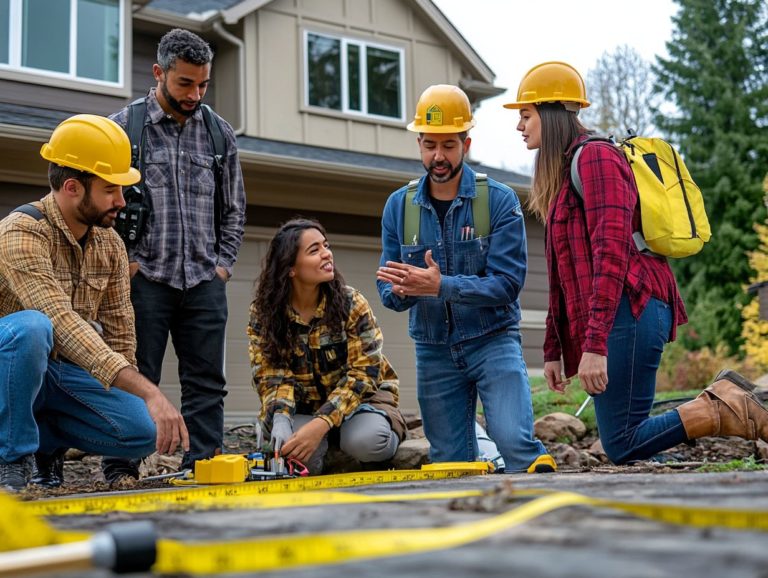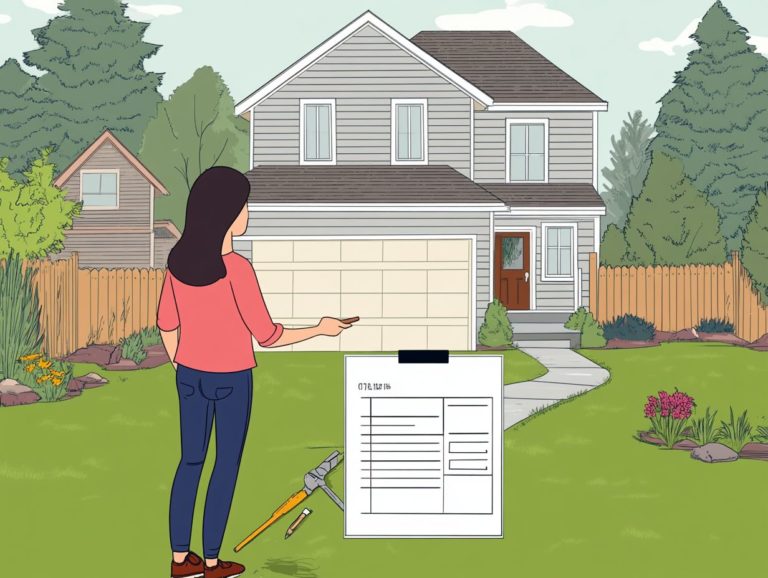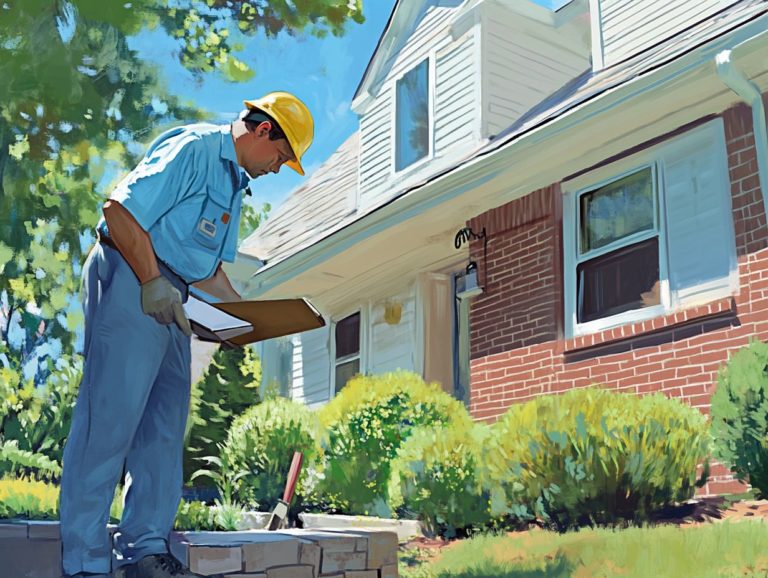How to Use Home Inspection Reports in Negotiations
Navigating the home buying process can feel overwhelming, particularly when it comes to deciphering home inspection reports.
These documents hold essential insights about the property, uncovering potential issues that could sway your purchasing decision. This guide will walk you through the elements included in these reports and show you how to interpret the findings effectively.
You ll discover strategies for leveraging this information in negotiations, tips for engaging successfully with sellers, and common pitfalls to steer clear of, ensuring you’re thoroughly prepared for every step of the journey.
Contents
- Key Takeaways:
- Understanding Home Inspection Reports
- Using Home Inspection Reports in Negotiations
- Tips for Successful Negotiations
- Common Pitfalls to Avoid
- Frequently Asked Questions
- What is a home inspection report?
- Why is it important to use home inspection reports in negotiations?
- When should I request a home inspection report?
- Who is responsible for obtaining a home inspection report?
- How can I use a home inspection report to negotiate a lower price?
- Can I use a home inspection report to back out of a purchase?
Key Takeaways:

Home inspection reports provide valuable information on the condition of a property and can help buyers negotiate a fair price.
Use home inspection reports as leverage in negotiations by pointing out major issues or requesting repairs or a price reduction, as highlighted in the impact of home inspections on negotiations.
Effective communication and working with the seller can lead to successful negotiations and avoid common pitfalls, such as making mistakes or handling difficult situations poorly.
Understanding Home Inspection Reports
Understanding home inspection reports is vital, whether you’re buying or selling a home in Oregon’s unique real estate market.
These reports offer a thorough evaluation of a property’s condition, highlighting everything from major structural issues to minor cosmetic repairs.
As a buyer, looking at the inspection report enables you to make informed decisions about your potential home. Understanding the home inspection report can play an important role in your negotiations and help facilitate a smoother transaction process.
What Information is Included?
A comprehensive home inspection report provides you with essential insights about major defects and minor repairs that may be required for a property.
This detailed document typically encompasses several key sections:
- Structural assessments include checking for cracks in walls or settling issues, shedding light on any problems with the foundation and framing.
- Roof conditions offer an evaluation of shingles, flashing, and drainage systems.
- A meticulous examination of the electrical and plumbing systems ensures that these vital infrastructures are safe and operational, identifying any outdated components or potential hazards.
- Pest inspections hold significant value as well, checking for infestations such as termites or rodents that could jeopardize the integrity of your property.
Based on the findings in these sections, you can derive repair estimates and contractor bids, enabling you to make informed decisions about necessary repairs and future maintenance.
Interpreting the Findings
Interpreting the findings of a home inspection report is essential for you as a buyer. It enables you to pinpoint major defects that may require immediate attention or repair.
By doing this, you can assess the potential impact on your investment and prioritize what needs to be addressed without delay. Focus on issues categorized as critical like roof leaks or electrical problems since these can pose serious safety hazards or lead to significant financial burdens if neglected.
The severity of these findings often influences the seller’s response and your available options. One common approach you might consider is utilizing a repair addendum, allowing you to formally request necessary repairs before finalizing the sale.
The seller may also offer credit instead of repairs, giving you the flexibility to allocate funds for addressing these concerns after closing. This adaptability ensures that the home meets your standards while aligning with your financial plans.
Using Home Inspection Reports in Negotiations
Using home inspection reports effectively can change the game in your home negotiations. With the right strategy, you can secure better terms and safeguard your investment.
By pinpointing critical negotiation points derived from the inspection findings, you can confidently request price reductions or seller concessions to address necessary repairs. This proactive strategy not only aids in managing your earnest money but also guarantees that your interests remain safeguarded throughout the negotiation process.
How to Leverage the Information

To make the most of a home inspection report, work closely with your buyer Realtor. This partnership helps you find negotiating repairs after home inspection strategies that can secure better terms in your purchase agreement.
Consider:
- Requesting repair credits to lower your overall expenses.
- Negotiating reduced closing costs based on inspection findings.
- Asking the seller to make specific repairs before finalizing the sale.
Your Realtor advocates for you and helps navigate any challenges to achieve the best outcome.
Negotiating Repairs or Price Reductions
Negotiating repairs or price reductions is a crucial step for you as a buyer. It ensures you don’t overpay for a property with hidden issues.
Present your findings clearly. Highlight significant concerns to justify your requests and show your diligence.
Use a repair addendum to detail specific issues needing attention. Understanding seller concessions can smooth negotiations for both parties.
Tips for Successful Negotiations
Effective communication can significantly boost your chances of a favorable outcome. Engage in clear, open dialogue to understand the issues better.
Partnering with an experienced buyer Realtor will help you navigate negotiations confidently.
Effective Communication Strategies
Clear and concise messaging is essential. Articulate your concerns and requests without ambiguity.
Maintaining professionalism fosters a respectful dialogue, emphasizing mutual interests. Expressing empathy helps sellers feel understood and valued.
A collaborative spirit paves the way for problem-solving. By using these techniques, you enhance rapport and increase the chances of a successful negotiation.
Working with the Seller
Collaborating with the seller can lead to favorable outcomes. Focus on insights from the inspection report during your discussions.
Encourage open dialogue by establishing a cooperative atmosphere. Share clear objectives to approach negotiations as problem solvers.
Actively listen and validate each other s perspectives. Seek common ground to turn potential tensions into creative solutions.
By prioritizing collaboration, you enhance transaction success and build lasting relationships for future interactions.
Common Pitfalls to Avoid

Navigating the home inspection process is filled with pitfalls. Avoiding them ensures a smooth transaction.
Be mindful of your approach and stay informed about potential issues. This will protect your interests during the home purchase.
Mistakes to Watch Out For
Several mistakes can occur during negotiations. As a buyer, watch for key issues in the home inspection report.
One common pitfall is underestimating the significance of the inspection report. This document outlines necessary repairs and informs your negotiation strategy.
Failing to prioritize your negotiation points can derail discussions. Identify which repairs are deal-breakers (issues that could stop the sale) and which are merely preferences.
Being overly aggressive with your requests can create unnecessary tension, making the seller less inclined to cooperate.
Approach negotiations thoughtfully, utilize the home inspection report to your advantage, and maintain a balanced tone for greater success.
How to Handle Difficult Situations
Navigating tough negotiation situations can be tricky, but you can do it! Focus on maintaining your composure to keep your thoughts and responses clear.
Seek compromise whenever possible. Finding common ground showcases your flexibility and fosters a collaborative atmosphere.
Use negotiation techniques like active listening and reframing objections to address concerns without escalating tensions.
Ultimately, cultivating a professional demeanor enhances your credibility and encourages respectful interactions, paving the way for positive outcomes and stronger relationships.
Frequently Asked Questions
What is a home inspection report?
A home inspection report is a detailed document outlining the current condition of a property, including potential issues or defects that may need addressing.
Why is it important to use home inspection reports in negotiations?

Using a home inspection report during negotiations gives you leverage as a buyer by providing evidence of necessary repairs or issues that may affect the overall property value. Understanding the role of home inspections in buyer-seller negotiations can further strengthen your position.
When should I request a home inspection report?
Request a home inspection report before making an offer on a property. This helps you understand the property’s condition and negotiate for necessary repairs or price adjustments.
Who is responsible for obtaining a home inspection report?
Typically, the buyer is responsible for arranging and paying for a home inspection report. However, in some cases, the seller may provide a pre-listing inspection report for potential buyers to review.
How can I use a home inspection report to negotiate a lower price?
If a home inspection report reveals significant issues or necessary repairs, use this information to negotiate a lower price. You can also refer to tips for negotiating upgrades after home inspection to help you avoid unexpected expenses and potentially save money in the long run.
Can I use a home inspection report to back out of a purchase?
Yes, if a home inspection report reveals major issues not previously disclosed, you may have the option to back out of the purchase or negotiate for the seller to make necessary repairs before proceeding with the sale.






